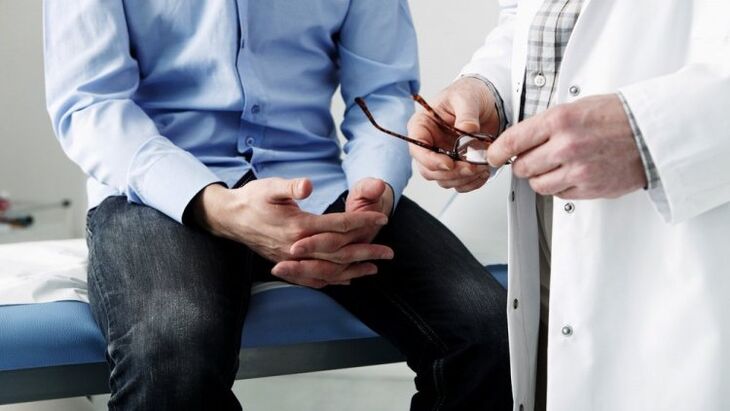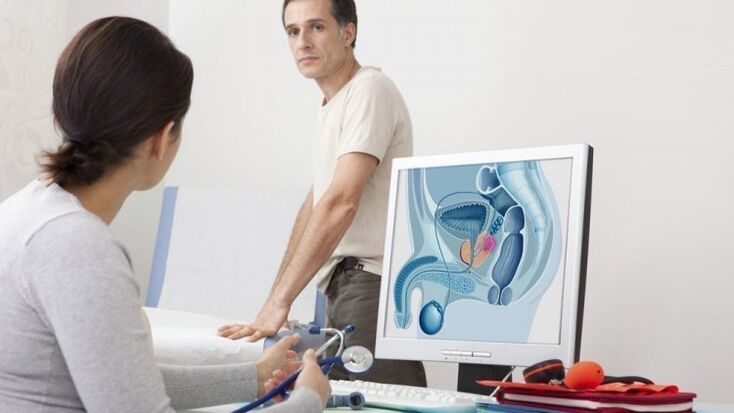The inflammatory process in the prostate gland (prostate) is usually called prostatitis. The prostate gland is an exclusively male organ located in the pelvic area below the bladder. It performs several functions: the secretion of the prostate is part of the sperm, at the moment of sexual arousal, the gland plays the role of a sphincter - it blocks the entry of the bladder.
Prostatitis: urgent problem
According to American researchers, prostatitis is detected in about 25% of patients with urological problems. And in general, about 9% of the male population worldwide suffers from this disease.
In one country, this pathology covers about 35% of young men, and in 7-30% prostatitis has a complicated form and ranks first among all diseases of the male reproductive system. This is most likely due to the mentality of our population - only a small number of men seek timely medical help. More often than not, the signs of prostatitis are ignored until the condition becomes very serious.
While the disease does not pose a serious threat to life, the disease can complicate a man’s life, lead him into severe depression, deprive him of moderate pleasure, and, to an extreme degree, make him sterile.
Acute and chronic prostatitis

According to the classification applied in 1995 in the United States, prostatitis is divided into the following forms:
- Acute bacterial prostatitis;
- Chronic bacterial prostatitis;
- Chronic abacterial prostatitis;
- Prostatitis without symptoms.
Acute prostatitis is the result of a bacterial attack on the glands. These can be microbes, viruses, protozoa and even fungi. Treatment of acute prostatitis based on the use of antibacterial drugs.
Chronic prostatitis, which is not associated with infectious agents, deserves special attention, as it occurs 8 times more often than bacterial prostatitis, has an unknown origin and causes much controversy about the method of therapy.
So, chronic prostatitis, unrelated to infection, has an unclear etiology. A number of factors have been identified that contribute to the slow development of inflammation in the prostate.
- Inactive lifestyle (vehicle transporters, office workers);
- Disorders in intimate life: intercourse that is too infrequent or too frequent, interrupted relationships, sexual misconduct;
- Constipation;
- Hypothermia and frequent infectious diseases;
- Sexually transmitted infections and the presence of other urological diseases in history;
- Weak immunity and severe chronic disease.
Signs of prostatitis: the opinion of a urologist to the contrary

Acute prostatitis, as a rule, is accompanied by general toxic symptoms: fever, loss of strength, decreased mood, weakness, etc. A man complains of pain in the lower abdomen or buttocks, scrotum or groin. Pain also manifests itself during urination, defecation, after intercourse. A man can detect the discharge of gray or gray-green fluid from the urethra, there is blood in the semen.
If the opinion of a urologist coincides with acute prostatitis, then a dispute arises with the clinical manifestations of chronic prostatitis.
A large number of experts consider the main symptom of chronic prostatitis to be erectile dysfunction. We hear about this on TV screens advertising anti-prostatitis drugs. Many men associate their failure in bed with prostatitis, independently prescribing treatment for themselves with advertised medications.
Oncourologists and researchers at the Institute of Urology believe that this is a misrepresentation of the male half for promoting drugs. In his opinion, chronic prostatitis does not cause erectile dysfunction, and episodes of male impotence are merely psycho-emotional restriction and self-hypnosis. Treatment of erectile dysfunction in this case is reduced to a conversation with a psychotherapist.
Doctors note that recently prostatitis has become a commercial disease where careless doctors generate money. The applicant is diagnosed with a non -existent disease, many expensive diagnostic and treatment procedures are prescribed, and then the patient inspires himself, waits for manifestation, and they don’t wait.
The indisputable signs of prostatitis are pelvic pain, pain when urinating and after ejaculation. The enlarged and inflamed glands can compress nearby organs, which can cause constipation and difficulty urinating. Pain after ejaculation is caused by the contraction of the ducts, after the release of sperm, and the contraction in the inflamed glands will cause pain.
The quality of sexual life is violated: the man states that he is less interested in sex life, and pleasure has been "erased", there is no sense of satisfaction from intimacy. Painful ejaculation is another reason to reject intimacy.
The development of infertility with chronic inflammation of the prostate gland is associated with changes in the spermogram, which is inevitable, because the chemical composition of prostate secretions changes. Sperm count decreases, pathological forms or dead sperm appear.
How to take care of men's health?

A man's health is in the hands of a competent urologist! As soon as there are signs of prostatitis, it is necessary to see a doctor. The treatment is long and complex. Depending on the etiology, these include antibiotic therapy, anti-inflammatory drugs and decongestants, peptide regulators, painkillers, prostate massage, and physiotherapy treatments.
It is believed that married men are more likely to get prostatitis. Frequent sex life with one partner does not provide an opportunity for the development of stagnant and inflammatory processes in the glands. Therefore, marriage and fidelity to a partner, no matter how sound, are prostatitis prevention measures.

























